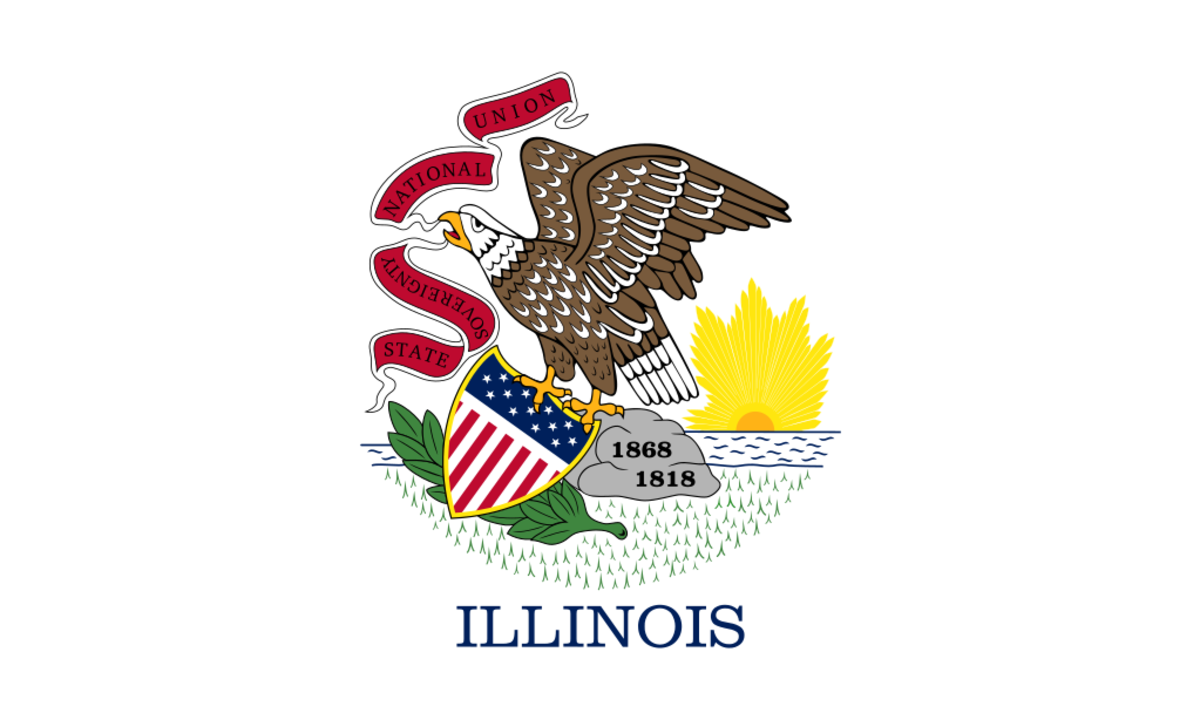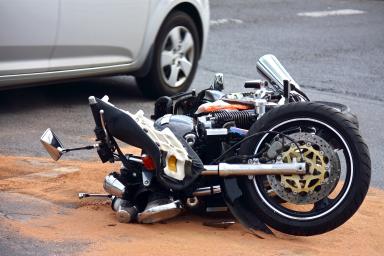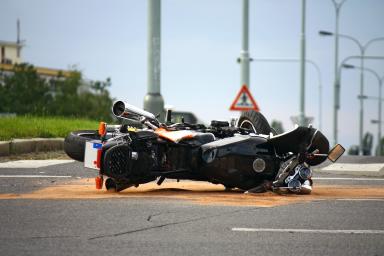Illinois Motorcycle Laws

Motorcycle accidents in Illinois can be devastating and even deadly. According to the Illinois Department of Transportation's (IDOT) 2020 Crash Facts, motorcycle-related accidents accounted for just 1.2% of total crashes but 14.1% of all fatal crashes in the state. The document shows that Illinois had 2,991 motorcycle crashes in 2020, resulting in 2,172 injuries and 153 fatalities.
Some of the deadliest roads for motorcyclists in the state include the Stevenson Expressway, the Elgin O’Hare Tollway, the Dan Ryan Expressway, and Route 66.
The statistics above highlight the importance of understanding and obeying motorcycle laws in Illinois to stay safe on the road and prevent accidents. Illinois has several mandates in place to protect motorcyclists, such as licensing laws, equipment regulations, DUI laws, and lane-sharing laws.
Illinois Motorcycle Licensing Law
In Illinois, individuals who wish to legally operate a motorcycle on public roads are required to obtain a motorcycle license or an endorsement on their driver's license. A Class M license is needed to operate any motorcycle or motor-driven cycle, while a Class L license is required to operate a motorcycle with an engine displacement of less than 150 cc. To obtain these, one must meet the following requirements:
Age: The minimum age for a motorcycle license in Illinois is 16 years old. If an applicant is under the age of 18, they must also have the written consent of their parent or legal guardian.
Driver's license: Applicants must already possess a valid driver's license issued by the state of Illinois.
Motorcycle training program: Applicants who are younger than 18 years old must complete an IDOT-approved motorcycle training program. This course consists of both classroom instruction and on-cycle training.
Written and driving exams: Applicants must pass a written exam on Illinois motorcycle laws and safety, as well as a road test to demonstrate their ability to safely operate a motorcycle on public roads. However, there is an exception for individuals 18 and older who have successfully completed an IDOT Motorcycle Rider Education Course.
Motorcycle licensing requirements may vary based on the type of motorcycle being operated. For example, operators of three-wheeled motorcycles, also known as trikes, may be subject to additional licensing requirements.
Illinois Laws On Motorcycle Equipment
There are specific laws in place regarding the equipment and features required on motorcycles to ensure the safety of riders and other road users.
All motorcycles must have at least one white headlight and at least one red taillight, both of which must be in good working condition. They must also have at least one brake that can be operated by hand or foot and a parking brake that can be engaged to prevent them from moving when parked.
Additionally, motorcycles must have at least one rearview mirror that provides a clear view of the area behind them. Footrests are also required for passengers.
Lastly, handlebars on motorcycles must not be higher than the height of the operator's shoulders when seated on the motorcycle, and a rider should always have at least one hand holding the handlebars when driving.
Illinois Eye Protection Law for Riders
Motorcycle operators are required by law to wear eye protection while riding unless their motorcycle is equipped with a windshield or screen. The purpose of this law is to prevent debris or other foreign objects from entering the rider's eyes, which could cause temporary or permanent damage and impair their ability to safely operate their vehicle.
Acceptable forms of eye protection include goggles, glasses with shatter-resistant lenses, and face shields that attach to helmets. Sunglasses are not considered acceptable forms of eye protection as they do not provide adequate coverage and protection.
There is no law in Illinois that requires motorcycle riders to wear protective helmets and clothing. However, the IDOT strongly recommends riders do so. In addition, reflective and bright-colored clothing is said to be the best option for being seen on the road.
Illinois Motorcycle DUI Law
According to the 2020 Illinois Crash Facts, motorcycle riders accounted for 11.8% of alcohol-related crash fatalities. The Illinois Motorcycle DUI Law states that it is illegal to operate a motorcycle under the influence of alcohol or drugs. A person is considered to be driving under the influence if their blood alcohol concentration (BAC) is .08% or higher.
Impaired drivers in Illinois are subject to mandatory penalties, including driver's license suspension or revocation, fines of $500 to $5,000, and community service. Additionally, those convicted of DUI may be required to install a breath alcohol ignition interlock device on their vehicle. These penalties are severe and often accompanied by a driver's license suspension or revocation.
For drivers under the age of 21, the state follows a Zero Tolerance Program for Underage Drinking, where the legal BAC limit is .00%. Any person under 21 who is found to have any traceable amount of alcohol or drugs in their system while driving will face a statutory summary suspension of driving privileges for a minimum of six months. A second violation will result in a two-year revocation of driving privileges.
Illinois Motorcycle Lane Splitting and Lane Sharing Law
Illinois law emphasizes that both automobiles and motorcycles need a full lane to operate safely. This means other drivers should not attempt to pass motorcycles within the same lane, especially in heavy traffic or when a motorcyclist is turning or exiting a highway.
In addition, the state prohibits lane splitting. This means a motorcyclist may not pass on the right of any vehicle proceeding in the same direction unless there is an unobstructed lane of traffic available to permit such passing maneuvers safely.
The reason for the ban on lane splitting is to ensure the safety of motorcyclists and other drivers on the road. Riding between two lanes of traffic increases the risk of accidents, especially if other drivers are not aware of the motorcyclist's presence.
Illinois Motorcycle Insurance Requirements
All motorcycle owners and riders in Illinois are required by law to have liability insurance coverage to operate their motorcycles on public roads. Insurance is designed to provide financial protection in the event of an accident, which can help pay for medical expenses, property damage, and other associated costs.
The minimum liability insurance requirements for motorcycle owners and riders are as follows:
$25,000 bodily injury liability coverage per person
$50,000 bodily injury liability coverage per accident
$20,000 property damage liability coverage per accident
These are only the minimum requirements for liability insurance coverage. Motorcycle owners and riders may also choose to purchase add-ons, such as comprehensive, collision, or uninsured/underinsured motorist coverage, to provide extra protection in the event of an accident.
Failure to maintain the minimum insurance coverage required by law can result in up to a $1,000 fine and even the suspension or revocation of one’s driver's license.
It is important to always carry proof of insurance with you while operating a motorcycle on public roads and to keep your insurance coverage up-to-date to avoid any legal or financial consequences.
Illinois Is a Fault State for Insurance Claims
Illinois is a fault state for insurance claims, which means when a person is involved in a car or motorcycle accident, the insurance companies involved will investigate who was at fault. The at-fault party or their insurance company is then responsible for paying for the damages and injuries caused by the accident.
As stated in the previous section, state law requires drivers to carry a minimum amount of liability insurance coverage to pay for damages and injuries caused in a car or motorcycle accident.
When a driver is involved in an accident in Illinois, they are required to report it to their insurance company as soon as possible. The insurance company will then conduct an investigation to determine who was at fault based on factors such as traffic laws, witness statements, and police reports.
If you are at fault for the accident, your insurance company should pay the damages and injuries up to your policy’s coverage limit. If the damages exceed the limit, you may be personally liable for the excess amount. Meanwhile, if the other party is deemed to be at fault, you can file a claim with their insurance company. Your own insurance company may also be involved, especially if you have uninsured or underinsured motorist coverage.
It is important to carry adequate insurance coverage and to report any accidents to your insurance company as soon as possible in order to protect yourself and ensure that you receive fair compensation for any damages or injuries you have sustained.
How Much Can One Sue for a Motorcycle Accident in Illinois
Determining the average amount of settlements for motorcycle accidents in Illinois can be difficult as several factors should be taken into consideration, including the severity of one’s injuries, other economic and noneconomic damages, the degree of fault assigned to each party, and the available insurance coverage.
It is also worth noting that there are no limits on damages in Illinois for personal injury cases, including those involving motorcycle accidents. In 2010, the Illinois Supreme Court ascertained that the cap on noneconomic damages is unconstitutional, effectively removing the limit on compensation a motorcycle accident victim may be able to receive in a personal injury case.
In Illinois, lawyers typically work on a contingency fee basis in personal injury cases. This means attorney's fees are calculated as a percentage of the awarded compensation, which is typically around 33% to 40%. This consequently affects the total damages plaintiffs can obtain.
For example, if a plaintiff wins a settlement of $100,000 and their attorney charges a 33% contingency fee that translates to $33,000, the victim with have a net payout of $67,000.
An experienced motorcycle accident attorney can help victims explore all available options for compensation and negotiate with insurance companies to secure a fair settlement based on the specific circumstances of their case.
Illinois Is a Modified Comparative Negligence State for Motorcycle Accident Lawsuits
Illinois is a modified comparative negligence state for motorcycle accident lawsuits. This means that in cases where the victim is partially at fault for the accident, their compensation may be reduced in proportion to their degree of fault. For example, if the victim is found to be 25% at fault, 25% will be subtracted from the total awarded damages.
The modified comparative negligence rule applies to cases where the victim's fault is less than 50%. If their fault is determined to be 50% or more, they may not be entitled to any compensation.
Illinois Statute of Limitations for Motorcycle Accidents
The statute of limitations for motorcycle accidents in Illinois is two years from the incident’s date. This means that if a victim fails to file a lawsuit within the timeframe, they may lose their right to seek compensation for their injuries and damages.
However, there are exceptions to the two-year statute of limitations; personal property-related claims have a five-year statute of limitations.
Motorcycle accident victims in Illinois need to understand the applicable statute of limitations for their case and act promptly in pursuing legal action. Filing a personal injury lawsuit can be a complex and time-consuming process, so it is important to consult with an experienced attorney as soon as possible.
Legal Resources for Illinois Motorcycle Accident Victims
Illinois Motorcycle Operator Manual
The Illinois Motorcycle Operator Manual is a comprehensive guide that outlines the laws and regulations for operating a motor vehicle on Illinois roads. It covers various topics, such as traffic signals, speed limits, passing, and turning. Motorcycle accident victims need to understand their legal rights and responsibilities when it comes to motorcycle accidents. It is also essential for all Illinois motorcyclists to review this guide to stay safe and informed on the road.
Illinois Lawyer Referral Service
The Illinois State Bar Association operates a Lawyer Referral Service that helps people find qualified and experienced attorneys in Illinois. It is designed to connect injured victims and their families with lawyers who specialize in personal injury law and have experience representing clients in motorcycle accident cases. The service also offers affordable rates for initial consultations, making it easier for victims to access legal help when they need it most.
Illinois Legal Aid Online
Illinois Legal Aid is a nonprofit organization that provides free legal services and resources to low-income residents of Illinois. For motorcycle accident victims who may be struggling financially, this site can be an invaluable resource as it offers a range of legal services and resources, including information on personal injury law and how to navigate the legal system. It also has a network of volunteer attorneys that can provide free legal advice and representation for qualified individuals.
Illinois Crash Report Resources
The Illinois Traffic Crash Report Online System is designed to provide a convenient way for people to access motor vehicle accident reports. It allows motorcycle accident victims and their families to easily obtain a copy of their accident report when pursuing a personal injury or insurance claim. Accident reports typically contain key information, such as the date, time, location, and description of a motorcycle crash, as well as the names and contact information of the parties involved.
Illinois Free Legal Answers
Illinois Free Legal Answers is a website that gives free legal advice and assistance to low-income individuals who cannot afford to hire an attorney. Motorcycle accident victims struggling financially can post questions related to personal injury law, insurance claims, and other legal issues related to their motorcycle accidents, which will be answered by volunteer attorneys. The website is available 24/7, making it a convenient resource for individuals who may have questions or concerns outside of normal business hours.
Illinois State Police Motorcycle Safety Tips
The Illinois State Police Department's Motorcycle Safety Tips page is dedicated to promoting motorcycle safety and reducing the number of related accidents in the state. It offers a variety of resources and initiatives to educate riders and raise awareness about motorcycle safety.
Expertise.com StaffAuthor
Step into the world of Expertise.com, your go-to hub for credible insights. We don't take accuracy lightly around here. Our squad of expert reviewers, each a maestro in their field, has given the green light to every single article you'll find. From rigorous fact-checking to meticulous evaluations of service providers, we've got it all covered. So feel free to dive in and explore. The information you'll uncover has been stamped with the seal of approval by our top-notch experts.

Daniel NollReviewer
Daniel Noll is an experienced trial attorney at the Noll Law Office in Springfield, Illinois which represents those who have been injured in trucking, motorcycle, and car accidents throughout the state.


![¿Cuál es la indemnización promedio de las demandas por accidentes de moto? [2023]](https://images.ctfassets.net/k00sbju4hbzq/590XSDSoqNVs6XSMNY5s3G/a969ee3bedaaf9016cec601fc30f495b/average_motorcycle_accident_settlement.jpg?fit=fill&w=384&q=75)

